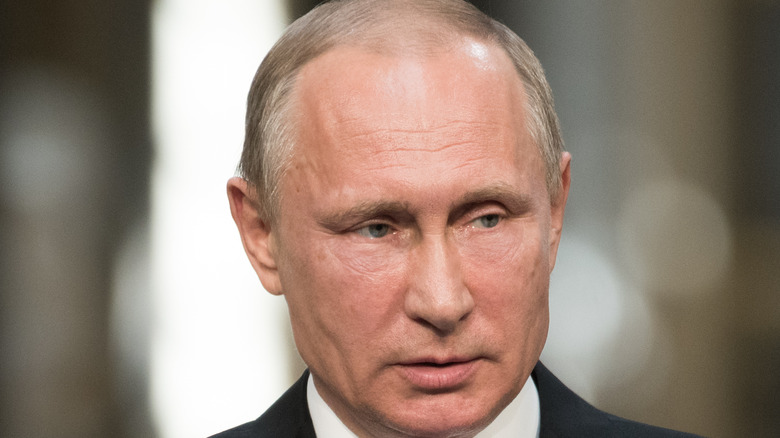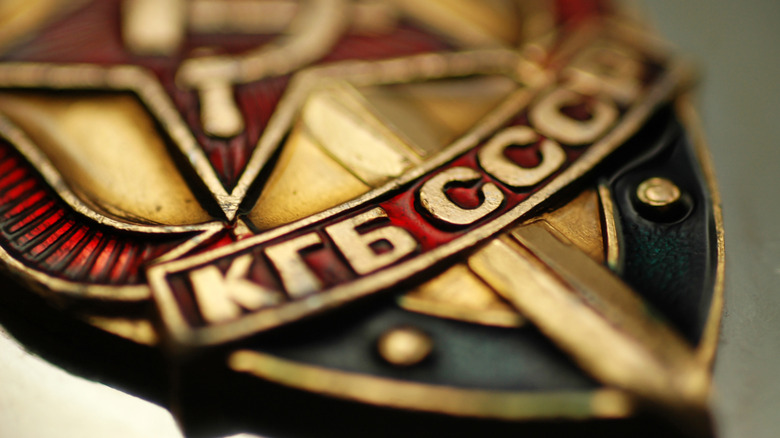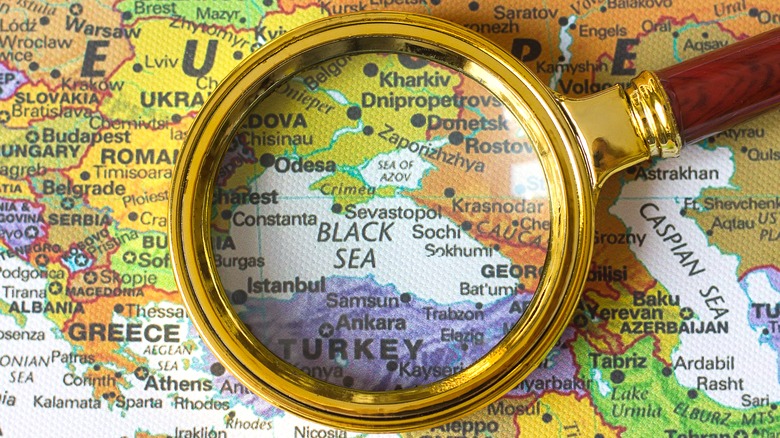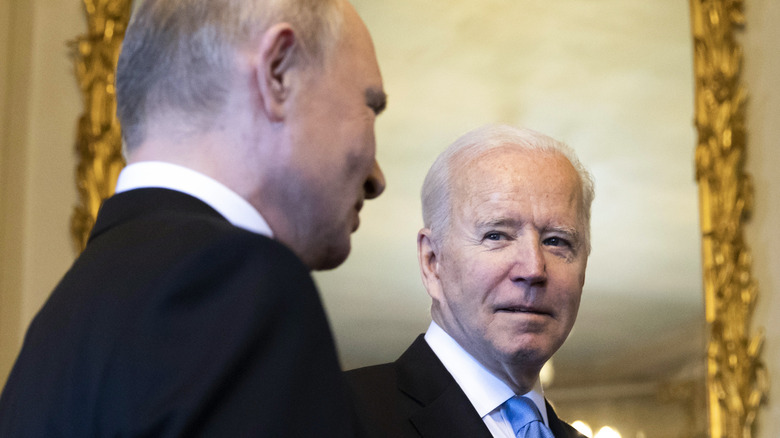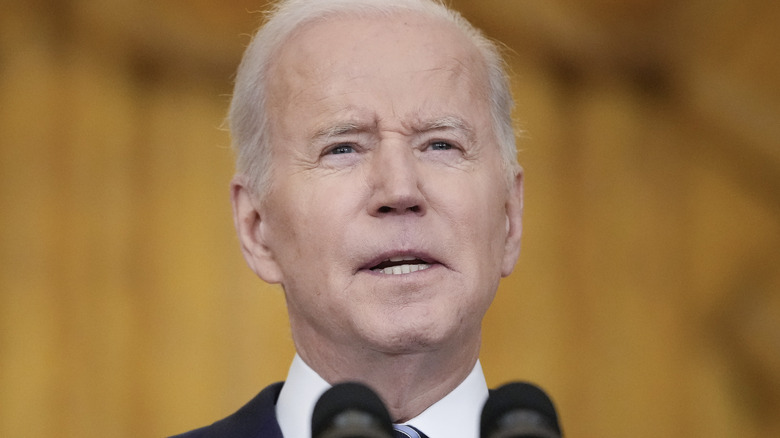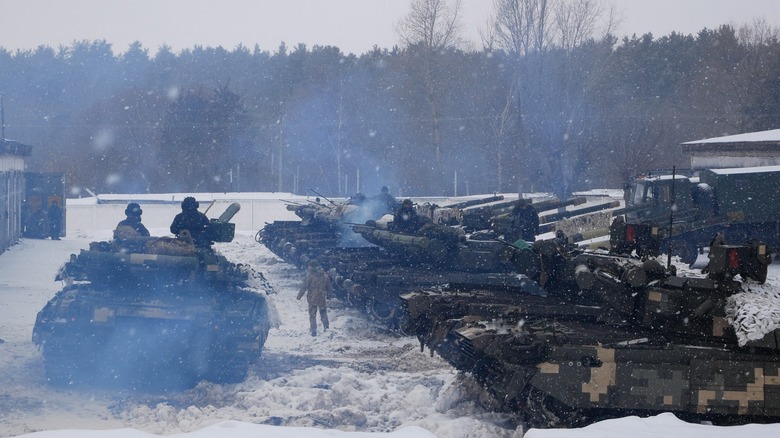Inside Vladimir Putin's Relationship With Joe Biden
As the conflict between Russia and Ukraine heated up in early 2022, the role of the United States on the issue remained a constant topic at the forefront of international affairs. Relations between Russia and the U.S. have been famously complex and span multiple eras of Russian leadership — from the tsars to the Soviet dictators (though some say the Soviet Union was run by oligarchy rather than by dictators) and now to Vladimir Putin's multiple terms as president. The relationship between Russian and U.S. leaders is no less complicated, including the tense relationship between Presidents Joe Biden and Vladimir Putin.
The U.S. Department of State explains that Russia has been present in U.S. foreign relations since the United States gained independence in the 1700s. Russia was supportive of the U.S. during the American Revolution. By 1832, Russia and the U.S. formalized trade agreements. Then, in 1867, U.S. Secretary of State William H. Seward purchased Alaska from tsar Alexander II. After the Bolshevik Revolution that followed World War I, President Woodrow Wilson instructed American diplomats not to recognize the new Bolshevik government, which established the Soviet Union a few years after the revolution began in 1917.
Vladimir Putin was a KGB Officer, Joe Biden was a senator
Though Russia and the United States had a long history, the two nations became allies during World War II, according to History. President Franklin D. Roosevelt and British Prime Minister Winston Churchill both met with Soviet leader Joseph Stalin as part of the Allied Powers, but the U.S. remained skeptical of Stalin and Soviet expansion into neighboring European countries after the war.
Suspicions held by both countries, an era referred to as the Cold War, lasted until the Soviet Union crumbled in 1989. This era included competitions between the two regarding the buildup of atomic weapons and even space exploration. In 1972 U.S. President Richard Nixon met with Soviet leader Leonid Brezhney and the men signed the Strategic Arms Limitation Treaty to work toward lowering the threat of nuclear war.
The next year in 1973 Joe Biden was elected to U.S. Senate, where he would remain for 36 years. For 12 of those years, he helped lead the Senate Foreign Relations Committee. Meanwhile, under Ronald Reagan's presidency, Soviet control slipped as eastern European countries began eradicating their communist governments and the Berlin wall came down in 1989 (via History).
Former KGB (the Soviet Union's security agency) officer Vladimir Putin joined the presidential staff of the new, post-Soviet Russia by the end of the 1990s. Given his high approval ratings, Putin became the interim president upon Boris Yeltsin's resignation in 1999. He then won the presidential election a year later. According to Britannica, Putin aimed to create a strongly regulated market economy as president.
Biden and Putin rose to higher offices around the same time
Vladimir Putin was reelected in 2004 but forced to stop at two terms in compliance with the constitution in 2008. His successor Dmitry Medvedev named him as prime minister. Instead of pursuing a second term, Medvedev stated that he and Putin would switch governmental positions if Putin's party succeeded at the polls. Despite protests due to irregularities in the election, Putin became president again in 2012. Those who opposed him were thrown into jail during his first year back as president (via Britannica).
By this time, Joe Biden had become the vice president of the United States under Barrack Obama, and he met Putin for the first time. It was 2011 and Putin was serving as prime minister of Russia. According to Foreign Affairs, Biden told Putin, "I don't think you have a soul."
CNBC explained that just a few years later in 2014 Putin's army took control of Crimea, a Ukrainian-owned but largely ethnically Russian peninsula in the Black Sea. Foreign Affairs reported that Biden worked to "pressure Russia to scale back its military interference in eastern Ukraine," to no avail.
The annexation of Crimea came after protests against Ukrainian President Viktor Yanukovych in the capital city of Kyiv, who soon after fled the capital. Citizens of Crimea voted to formally become part of Russia that same year. Despite Crimea's decision, British foreign minister William Hague and U.S. President Barack Obama disagreed with the notion that Russia should overtake Crimea.
Putin compared Biden to Trump
Controversy swirled around Russia's potential involvement in the 2016 U.S. election. However, after a 2018 meeting, President Donald Trump believed that Vladimir Putin was telling the truth when he claimed that Russia did not meddle in the election just days after the U.S. Justice Department began investigating Russian intelligence officers. The friendly demeanor of the meeting contrasted with the suspicions of Trump's advisors and many members of Congress (via The Atlantic).
In 2020, continued fears of election meddling and unfavorable policies toward Russia from Congress (despite President Trump's more cordial attitude) led Angela Stent of Brookings to refer to relations between the U.S. and Russia as "the worst that it has been since 1985."
Prior to Putin's first meeting in June of 2021 with Joe Biden, after he became president, he compared Biden with Trump in terms of careers prior to taking office — Trump being new to politics and Biden having "spent virtually his entire adulthood in politics." Putin described Biden's vast experience in politics as opposed to little prior experience as having advantages and disadvantages. Putin also relayed that he was not concerned with Biden's accusation that Putin is a "killer" (via Aljazeera).
Biden and Putin share no trust but have overlapping interests
The June 2021 meeting (or summit) was tense, yet mutually respectful. Analysts at the time stated that President Biden does not consider Putin to be a friend, but believes that Russia and the U.S. have overlapping interests and it is in those interests that the two nations should cooperate. ABC News reported that when asked if he feels that he can trust Putin, Biden stated that the summit was not about trust, but about "self-interest and verification." Biden claimed that he explained the priorities and values of the U.S., which included the wrongful imprisonment of two U.S. Marines, cyberattacks, and nuclear weapons in Iran.
Though this summit largely served only to provide a foundational understanding of the mutual interests of the two countries and how the U.S. would respond if those interests and if those of U.S. allies were threatened, Biden considered it a success. Putin seemed relaxed as well, calling the topics covered as "pragmatic" and calling Biden "balanced" and "professional." He even praised Biden's "level of moral values" (via ABC News).
Biden called the 2022 invasion of Ukraine "unprovoked"
Less than one year after the summit, Putin sent troops to the border of Ukraine, setting the rest of the world on high alert. Anticipating an invasion, President Biden threatened to impose sanctions on Russian banks (via The Guardian). After holding troops near the border for a few months, Putin launched his attack and invaded Ukraine on February 23rd, 2022. Biden called the attack "unprovoked and unjustified" in his official White House statement. He met with other G7 leaders as well, claiming that "the world will hold Russia accountable."
The Guardian detailed that on February 24th, 2022, Biden — true to his warning — announced the most severe sanctions in history, including severing Russia's largest bank from the U.S. financial system. These sanctions create economic penalties and export restrictions aimed at raising inflation and lowering Russia's purchasing power.
Biden said he wouldn't send U.S. troops to Ukraine but would send troops to protect member nations of the North Atlantic Treaty Organization (NATO). Any optimism for a positive relationship between Biden and Putin that followed their meeting in June of 2021 had certainly eroded in light of Russia's invasion of Ukraine.
